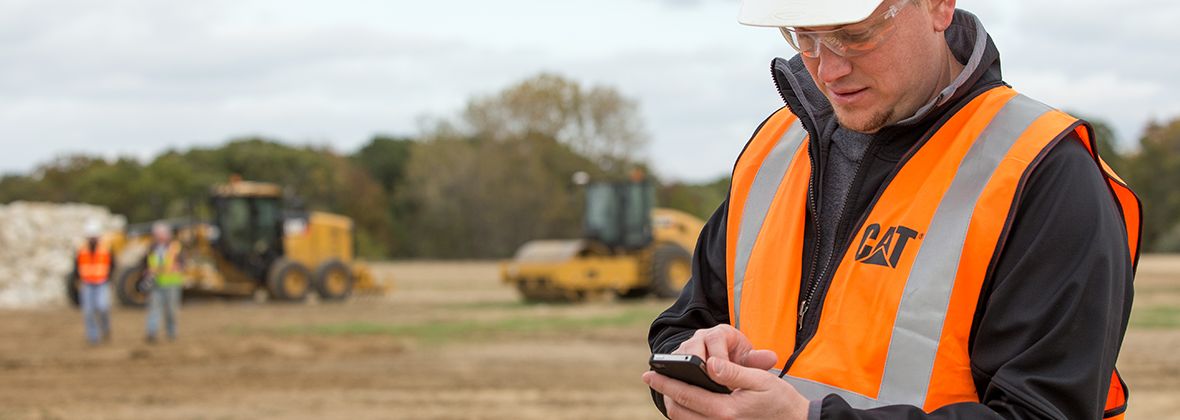Vous pouvez maintenant créer un compte pour gérer vos préférences et personnaliser votre expérience sur Cat.com.
Hi ! Puisque vous avez déjà un compte Caterpillar, nous avons automatiquement activé votre accès à Cat.com.
Hi ! Cat.com a été en mesure de récupérer votre profil Caterpillar, mais a besoin de quelques renseignements supplémentaires. Veuillez examiner votre profil et fournir toute information manquante.
Hi ! Cat.com a été en mesure de récupérer votre profil Caterpillar, mais a besoin de quelques renseignements supplémentaires. Veuillez examiner votre profil et fournir toute information manquante.


-
personclear
personclear
- place Find Dealer
-
Se connecterAccount
Effectuez l'enregistrement dès maintenant
Un seul compte. Pour tout Cat.
Votre compte Caterpillar est le seul compte à utiliser pour ouvrir une session dans les services et applications que nous offrons. Magasinez des pièces et des machines en ligne, gérez votre parc de véhicules, passez en mode mobile, et plus encore.
-
Explore Products
Browse all products on Cat.com
https://wwwqa.aws.cat.com
-
Buy Online
Shop products & more from our family of online store
https://qa3shop.cat.com/ShopLandingPageView
-
Find Used Products
Shop for certified used products
https://catused.com/
-
Rent Products
Find rentals at your nearest dealer
https://wwwqa.aws.catrentalstore.com
-
Manage My Equipment
Manage your fleet on VisionLink
https://vl.cat.com/visionlink?ui_locales=en-US
-
View Finance Solutions
Explore financing options on Cat Financial
https://www.cat.com/en_US/support/financing-protection.html
CAT Application
Effectuez l'enregistrement dès maintenant
Un seul compte. Pour tout Cat.
Votre compte Caterpillar est le seul compte à utiliser pour ouvrir une session dans les services et applications que nous offrons. Magasinez des pièces et des machines en ligne, gérez votre parc de véhicules, passez en mode mobile, et plus encore.
Find Dealer
Find Dealer
Need help finding a Cat dealer near you? Our dealer locator provides the most up-to-date information on Cat dealers close to you. Simply enter your address and select the type of equipment you're looking for. Or, if you already know the name of the dealer you're searching for, you can type in the dealer's name for a list of locations.
Your dealer has been set close
Would you like to set this dealer to your account as well?Your dealer has been set close
Would you like to set this dealer to your account as well?Your dealer has been set close
Would you like to set this dealer to your account as well?You're Leaving Cat.com
Note that by entering data in this application for purposes of obtaining driving directions, you are providing such data directly to Google LLC and/or its affiliates. By clicking "I Agree" or by using the Google Maps functionality to obtain driving directions, you acknowledge and agree that use of Google Maps is subject to the then-current Google Maps/Google Earth Additional Terms of Service at https://developers.google.com/maps/terms-20180207#section_9_3 and Google Privacy Policy at https://policies.google.com/privacy
You're Leaving Cat.com
Note that by entering data in this application for purposes of obtaining driving directions, you are providing such data directly to Google LLC and/or its affiliates. By clicking "I Agree" or by using the Google Maps functionality to obtain driving directions, you acknowledge and agree that use of Google Maps is subject to the then-current Google Maps/Google Earth Additional Terms of Service at https://developers.google.com/maps/terms-20180207#section_9_3 and Google Privacy Policy at https://policies.google.com/privacy
You're Leaving Cat.com
Note that by entering data in this application for purposes of obtaining driving directions, you are providing such data directly to Google LLC and/or its affiliates. By clicking "I Agree" or by using the Google Maps functionality to obtain driving directions, you acknowledge and agree that use of Google Maps is subject to the then-current Google Maps/Google Earth Additional Terms of Service at https://developers.google.com/maps/terms-20180207#section_9_3 and Google Privacy Policy at https://policies.google.com/privacy

